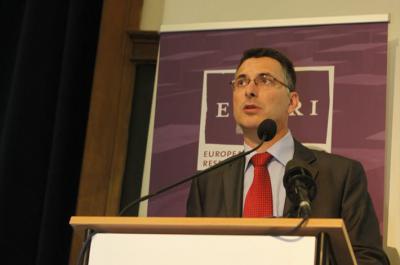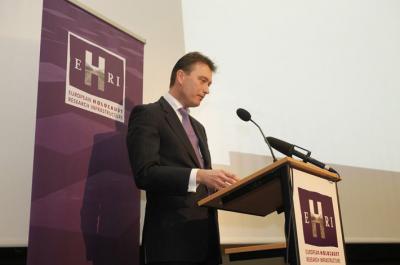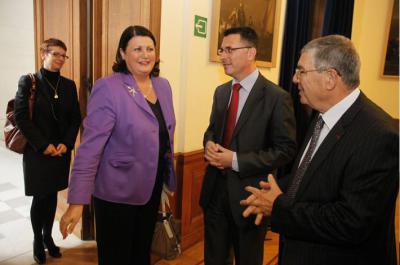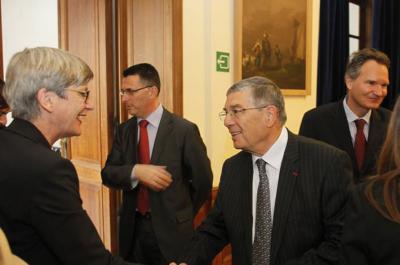
Dr. Conny Kristel of NIOD Institute for War, Holocaust and Genocide Studies (the Netherlands) and Director of EHRI, together with Avner Shalev
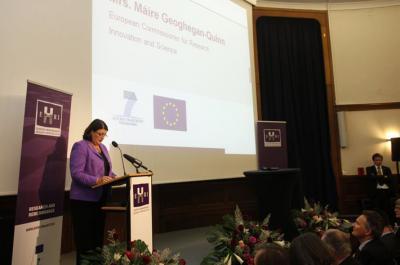
European Commissioner for Research, Innovation and Science, Maire Geoghegan-Quinn, speaking at the launch event
17 November 2010
Education Minister Gideon Sa’ar and Yad Vashem Chairman Avner Shalev Represent Israel at Brussels Event
A European-wide archives and research project about the Holocaust that will allow easier access to dispersed and unconnected Holocaust documents was launched last week in Brussels.
The European Holocaust Research Infrastructure (EHRI) is to date the most important European research project about Holocaust documentation.
EHRI was launched in Brussels on November 16, 2010, at a special event under the patronage of Council President Herman Van Rompuy. Israeli Education Minister Gideon Sa’ar, European Commissioner for Research Innovation and Science Maire Geoghegan-Quinn, the State Secretary of Education, Culture, and Science of the Netherlands Halbe Zijlstra, Yad Vashem Chairman Avner Shalev and Director the Yad Vashem Archives Dr. Haim Gertner participated in the event.
“The establishment of EHRI is especially important as different historical narratives are competing in Europe,” said Avner Shalev, Chairman of Yad Vashem. “Through EHRI Europe is stating its understanding that the Holocaust has unique standing in the joint European historical narrative.”
With 20 partner organizations, from 13 European countries including Israel, the 4-year, 7 million euro project, is a part of the EU’s research program FP7, in which Israel is a partner.
“The nature of the events of the Holocaust, and the chaotic state of Europe in the immediate post-war, coupled with the Nazis’ effort to destroy not only the Jewish people, but all memory of them, has meant that information about the Holocaust is spread all over the world,” said Shalev. “In order to be able to begin to piece together what happened, information that is located in numerous archives throughout Europe must be connected. EHRI will facilitate research into the Holocaust, and help us further piece together what happened, when and to whom.”
Speaking at the launching at the Royal Museum of Art and History in Brussels, Israeli Education Minister Gideon Sa’ar stated, “It is a moral duty to reassemble the shattered fragments of memory – in order to fill in the gaps and restore the faces to the victims. To me, as the Minister of Education of the State of Israel, and for my fellow Israelis and Jews, this moral obligation is unquestionably solemn and clear.” In reference to the EHRI project he said, "I see much importance in the cooperation of so many organizations, aimed at improving the capacity of humankind to reflect, research, and in fact know and better understand this tragic period in the history of my People, in the history of Europe, and in the history of humankind."
"The European Holocaust Research Infrastructure has a great responsibility to preserve the proof of the Holocaust for people in Europe and worldwide, for all of us today, and for future generations,” said European Commissioner for Research, Innovation and Science, Maire Geoghegan-Quinn, at the event on Tuesday. She stressed that 65 years after the liberation of Auschwitz "there are, unfortunately, still some people who, in the guise of promoting research and debate, question the scale, if not the very fact of the Holocaust."
Echoing Geoghegan-Quinn, State Secretary of Education, Culture and Science of the Netherlands Halbe Zijlstra, remarked that "there are still people in the world that wish to trivialize the events of those years or even deny them. By making hard information from the archives available online, the EHRI enables us to refute their claims in a solid and undeniable manner. Because the EHRI lets the facts speak clearly for themselves."
Lead by the Dutch organization NIOD (The Institute for War, Holocaust and Genocide Studies in Amsterdam), EHRI is a project of the European Union that will be a source of information for researchers and educators around the world. Yad Vashem has been active in this project since its inception, and is playing a leading role in the various sub-projects that make up EHRI. Working projects will focus on creating a shared thesaurus of 5,000 keywords to allow unified searches across collections that contain millions of documents in numerous languages, encouraging research by creating a network among experts in various Holocaust-related fields through forums to explore cooperation in names recovery, Holocaust art, identifying photos from the Holocaust period and more. Other aspects of the project will deal with information technologies, access and scholarships for researchers to study at Yad Vashem and at other archives.




